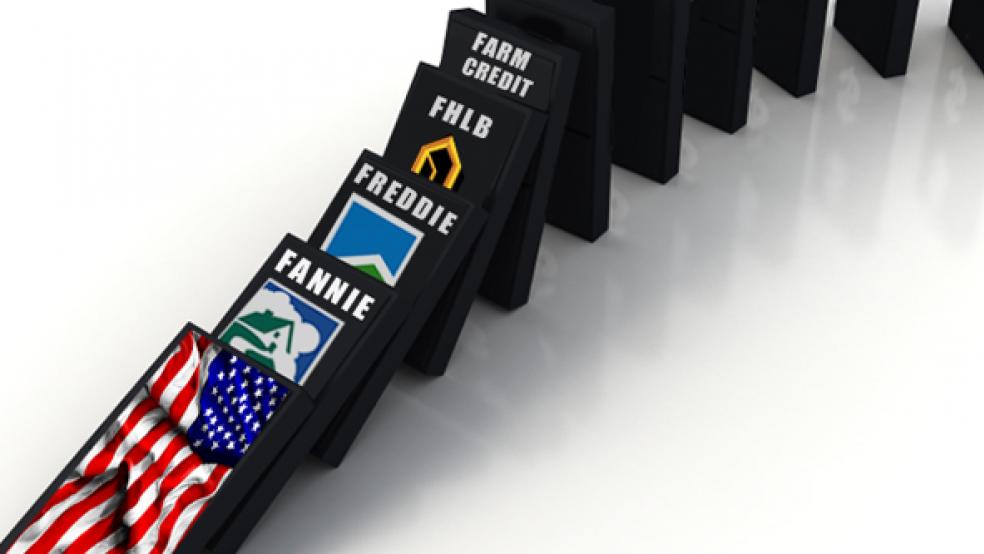Thump, thump, BANG.
That's the sound of the dominoes toppling in the wake of Friday's decision by Standard & Poor's to yank the coveted AAA rating from long-term US government debt securities.
The first casualties were reported almost immediately. Insurance companies domiciled in nations that don't have a AAA credit rating can't expect to hold on to their top slots, so it was no surprise that S & P followed up on its Treasury downgrade by trimming the ratings on five big insurers, including New York Life Insurance Co. to double-A plus.
Others directly in the firing line are state and local governments that rely heavily on federal government funding as well as government agencies and the securities that those agencies guarantee. Taking the hit today were 10 of the dozen Federal Home Loan Banks (the other two, in Seattle and Chicago, had already lost triple A status) and senior debt issued by Fannie Mae and Freddie Mac, agencies that rely directly on U.S. government funding.
You cut your finger, and the infection sets
in; two weeks later, the kidneys fail."
But these obvious casualties may not be the end of the story. "We're experiencing a kind of financial sepsis," says Hans Olsen, head of investment strategy for the Americas at Barclays Wealth, the private banking division of Barclays. "You cut your finger, and the infection sets in; two weeks later, the kidneys fail."
There are many second- and third-order consequences for the financial markets and for companies that run the gamut from financial services to the defense industry, experts say. Even before the downgrade, the Chicago Mercantile Exchange had applied what's known as a 'haircut' to Treasury securities used as collateral for trades cleared through the exchange. For every such trade, counterparties had to put up more collateral. Now the market is waiting to see if the Merc will boost collateral requirements again, and whether banks and brokerages will follow suit.
"I would suspect that the amount you can borrow against Treasurys and agency securities will go down," says Andy Johnson, head of investment grade fixed income at Neuberger Berman. That wouldn't be related directly to the downgrade, but rather a consequence of an actual or anticipated surge in volatility in the values of those securities following the downgrade and amidst all the market uncertainty. "The process of deleveraging that would follow would be painful, although I'm sure that the Federal Reserve would do everything to ensure it was as orderly as possible," Johnson adds.
does that mean for Euroland sovereign debt?”
Another domino that veteran bond fund managers can't help wondering about is what this mean for European credit markets. If S&P could take the unprecedented step of removing the triple-A rating from US debt, what about debt of nations like France, whose fiscal fundamentals are in far more perilous a state? "If S&P can take the U.S. down, what does that mean for Euroland sovereign debt?" says Kathleen Gaffney, a portfolio manager at Loomis Sayles in Boston. "Europe is in the cross-hairs today."
Gaffney’s sentiments were echoed by Paul Donovan, London-based deputy head of global economics at UBS AG. He told Bloomberg News, “France is not, in my view, a AAA country. France can’t print its own money, a critical distinction from the U.S. It is not treated as AAA by the markets.”
Ironically, the big banks are not in the spotlight. Survivors of the 2008 market crisis have improved their balance sheet and loaded up on cash. "Unless their financial situation deteriorates, and the implicit support of the government for "too big to fail" institutions becomes more important, I don't think that's an issue to concern us," says Johnson.
Still, without a clear, long-term solution to the underlying fiscal crisis haunting the United States, the number of dominos lined up and poised to fall will multiply. And no solution will be pain-free: cutting spending on heatlhcare or defense in order to prevent further erosion in the government's credit quality will take a toll on companies doing business in those sectors.
"What we know today is that there are a lot of dominoes to fall and that we don't necessarily know what they are yet," says Hans Olsen. "Something historic has happened."





